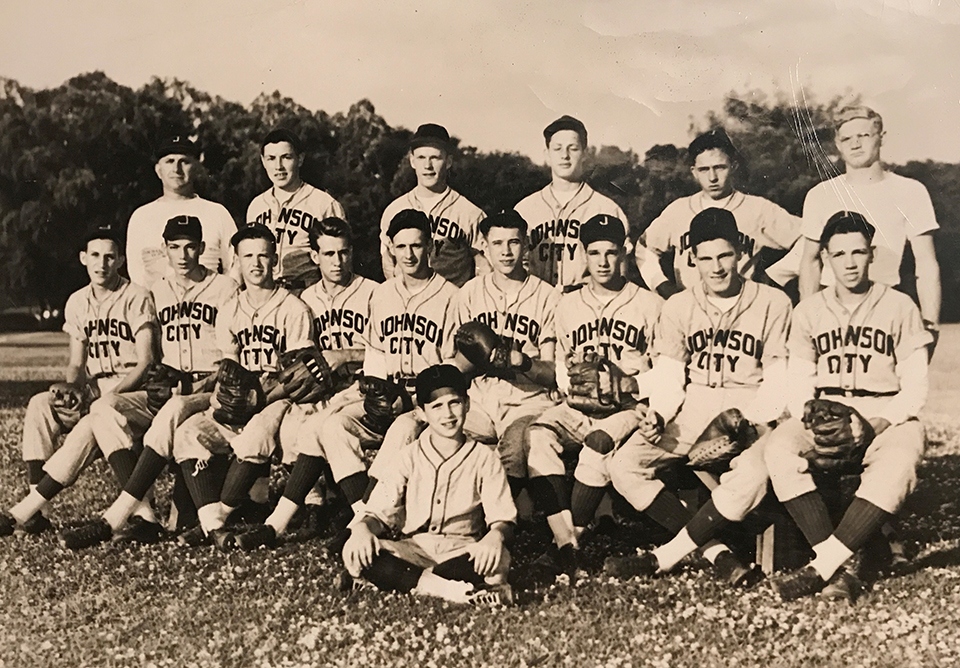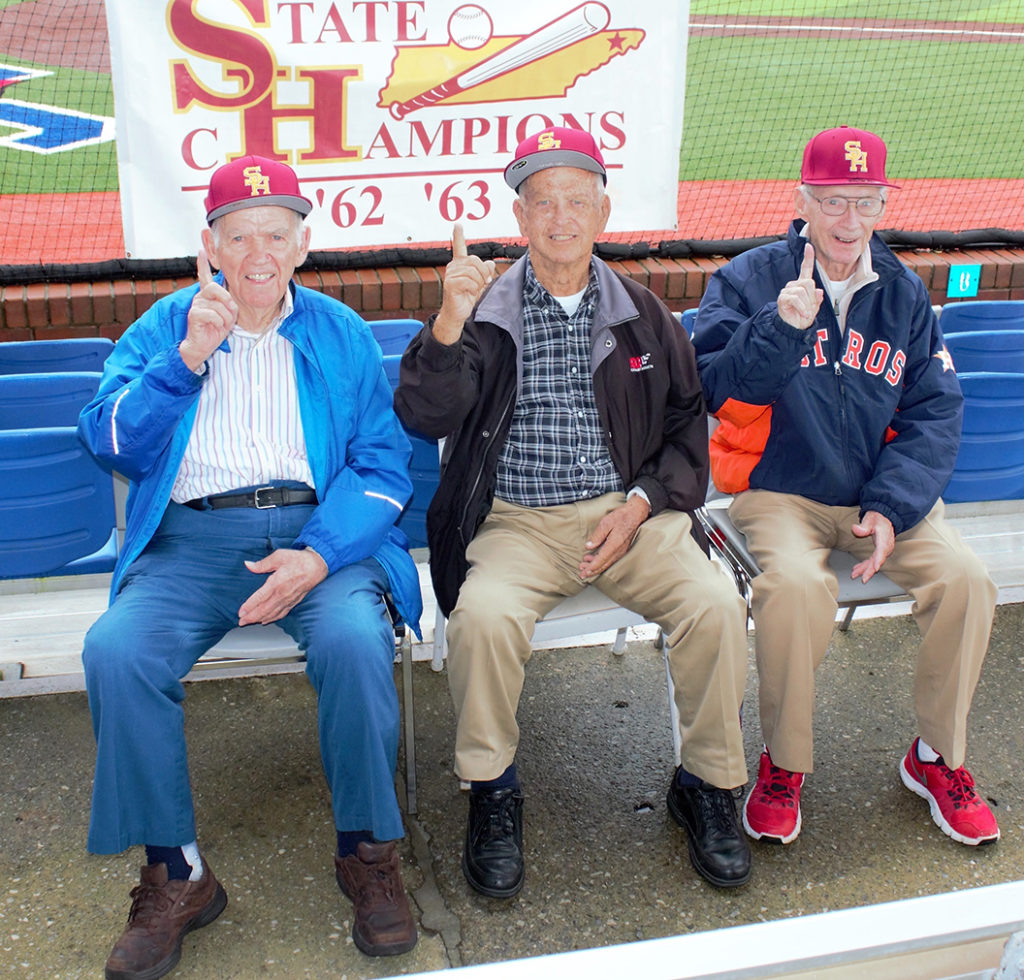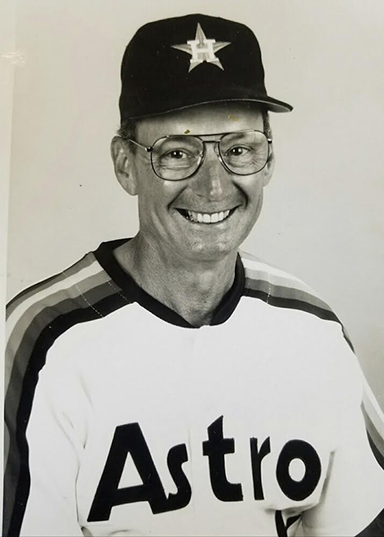
Science Hill’s 1947 state championship team. Billy Joe Bowman is seated in the middle of the front row.
By Trey Williams
Billy Joe Bowman pitched for Science Hill in its 1947 state championship victory and won two games and homered while helping Tennessee finish runner-up in the 1951 College World Series.
So when Science Hill won the state this spring and the Volunteers advanced to the CWS, it sure made it feel like the 90-year-old Bowman, who’d gone downhill in the past year, was destined to reach home.
And as if scripted, Bowman died on Saturday night, completing a full-circle sort of summer.
Bowman went 56-36 during six seasons in the minors, a stint interrupted by a two-year stay in the Army that took him to Korea. He pitched all the way to Triple-A and played for teams such as Rochester, Peoria, Chattanooga, Nashville and Houston, where he spent parts of three seasons including his final year in 1959.
Bowman met pitching coach Cot Deal in Houston, forming a friendship that led to a lengthy stay with the organization. Bowman pitched batting practice for years with Houston when it had players such as 6-foot-2, broad-shouldered Nolan Ryan and 6-foot-8, 225-pound J.R. Richard throwing gas.
“I guess I just wasn’t big enough to make the majors,” said a chuckling Bowman, who was a 5-foot-11, 160-pound right-hander. “J.R. Richard had a slider that was out of this world and his fastball could just eat you up on a given day. With his height and those long arms, I wouldn’t have wanted to walk up there and hit against him. …
“I saw Nolan pitch when he was 18. I believe we offered him $25,000 and a truck.”
Richard’s size reminded Bowman of 6-foot-8, 275-pound Tennessee defensive lineman Doug Atkins, who was often as grouchy and intimidating as he was big. Bowman recalled Atkins occasionally walking in the dorm and squeezing a random athlete’s arm while saying, “Get down on your knees and say ‘Daddy.’”
Atkins went on to the College Football Hall of Fame and Pro Football Hall of Fame.
“He was something to see on a football field,” Bowman said.
Mississippi State recruited Bowman aggressively after seeing him pitch for Science Hill against Memphis in the Southeast Regional championship in Mississippi.
“The coach from Mississippi State said, ‘Young man, I’ll give you a full scholarship, books, everything if you come to Mississippi State,’” Billy Joe said. “And I almost went. But General (Robert) Neyland and (UT coach) Cy Anderson came up on Elm Street – they pulled up one day and knocked on the door and they said, ‘We’ll give you a full scholarship, books, and we’ll give you a $25 a month stipend. And I signed the papers.
“The General saw me play against Chattanooga Central in the playoffs (in Maryville). They had a good ballclub. He stood behind home plate.”
Bowman recorded victories on the mound against Princeton and Southern California for the Vols as a sophomore in the ‘51 World Series. He also homered against the Trojans while helping the Volunteers finish runner-up to Oklahoma after a 3-2 loss.
“We had one heck of a ballclub and we had a hell of a coach in Cy Anderson,” Bowman said. “He was a former pro ballplayer.”
Bowman pitched 7 2/3 innings of relief on one day of rest for the victory in a 9-8 triumph against Southern Cal. He also homered and drove in two runs against the Trojans.
“I hit one over the scoreboard,” Bowman said. “I can still see that pitch going on the outer part of the plate. … And that last ballgame that we played that we lost (to Oklahoma), everybody was on Coach Anderson to put me in the ball game. And he was like, ‘Nope, nope, nope – he’s not going back in.’ …
“I said, ‘I feel okay coach.’ But he wouldn’t do it. He was just looking out for me.”
Anderson was a player’s coach, according to Bowman.
“That team was very similar to Science Hill, real loose and everyone always picking each other up,” Bowman said. “I really wish we’d won one more game like we did for Coach (John) Broyles at Science Hill.”
Bowman said Neyland was among the first to congratulate the baseball team when it arrived back from Omaha.
“He was there shaking everybody’s hand,” Bowman said. “Boy, he was something. Every day at lunchtime when he’d come to lunch he’d always come and pat me on the head. He’d say, ‘Eat all that food you can eat.’ I wasn’t as skinny as I am now, but I did maintain about the same amount of weight all the way through school.”
Bowman began his professional career going 11-3 with a team-best 2.10 ERA for the Appalachian League champion Johnson City Cardinals in 1953. Among his teammates that season was Joe McClain (10-2, 3.42 ERA), who’d been a sophomore on the Science Hill team during Bowman’s senior season when it won the Southeast Region.
“Billy Joe was a player,” said McClain, who went on to pitch for the Washington Senators and struck out Mickey Mantle twice in a game. “Him and Ralph Carrier pitched ‘em to that state championship.”

From left to right, Bobby Rowe, Hobe “Bobby” Leonard and Billy Joe Bowman in 2017 celebrating the 70th anniversary of the state title they won at Science Hill. PHOTO BY TREY WILLIAMS
Billy Joe’s younger brother Ferrell, who died in August of 2019, played some shortstop for the San Francisco Giants in the 1962 World Series.
“I got to play as a freshman at Science Hill and the guys would say, ‘You’re just getting to play because of your brother,’” Ferrell said with a chuckle. “I was the batboy for the 1947 Science Hill state championship team. They had good players back then, Pete Deloach and Willis Sexton and Jack Chinouth. But (Billy) Joe and Ralph – they were the mainstays. You could pitch one, then the other, and they seldom ever got beat. …
“I grew up hearing and seeing what a great player he (Billy Joe) was. I got a baseball scholarship to Tennessee because of Billy Joe. It made you proud to be his brother.”
Billy Joe, who also captained the ‘Toppers basketball team and ran track, combined with Carrier to shut out Memphis Christian Brothers in a 3-0 state championship win at Nashville’s Sulpher Dell Park. That was the home of the Southern League’s Nashville Volunteers, a team for which Billy Joe later pitched.
Bowman, a power pitcher, and the curveball-throwing Carrier effectively complemented one another. They also combined on a shutout in the 1947 semifinal, a 1-0 defeat of Franklin. Carrier and Bowman were always quick to credit their defense.
“Bobby Rowe was our shortstop and John Mackley was the catcher,” Bowman said. “They were our catalysts. Bobby just had that sixth sense, always on top of things. John was the quiet leader. … Willis Sexton was a good player to have in center field.”
The late Hobe “Bobby” Leonard was a cocky third baseman for the state-champion Hilltoppers in ‘47. He once told Rowe prior to taking the field against Tennessee High that if he got a sharply hit ground-ball he was going to flip it to Rowe at shortstop. Sure enough, much to Rowe’s chagrin, Leonard did so, leaving Rowe with no option but to throw quickly to first to retire the batter with an odd, if you will, 5-6-3 single-play.
Rowe said the stunt was greeted with grumbling and boos while Leonard smiled. Leonard said it was easy to stay loose and confident with Bowman and Carrier on the mound.
“I bet there haven’t been any two pitchers since Billy Joe and Ralph – any two pitchers at one time that were as tough as those two,” Leonard said. “I mean, (coach) John Broyles would just throw one, then throw the other, and we just mowed ‘em down.”
Bowman credited Howard McCorkle, a teacher who went on to become Johnson City Schools superintendent, with much of his early baseball development. McCorkle had a 1930-something Ford and would use it to pull players on a trailer to the baseball field on the opposite end of the block from Stratton Elementary School.
“Other than my dad (John Frank Bowman), who played with Pappy Crowe’s father (Manuel) for the Johnson City Soldiers,” Bowman said, “McCorkle had more to do with me getting into baseball than anybody.”
Billy Joe was a batboy when his father pitched for the Soldiers, which played home games on the Veteran Administration field that featured true dugouts and a cathedral of a grandstand that was often nearly filled with war veterans.
“They’d take the buses and bring the old soldiers, especially the ones that were crippled and couldn’t get there otherwise – they’d bring ‘em down to the field and unload them,” Bowman said. “It sure was (a beautiful scene). And even me as a kid, a young kid – to watch how they enjoyed it and cheered and would go on was something else.”
Discussing the Mountain Home (V.A.) ballpark one evening at a Johnson City Cardinals game when he was in his mid-80s, Bowman suddenly recalled Science Hill teammate John Mackley. Bowman and Carrier often credited Mackley for much of the Hilltoppers’ success. Mackley, who died in 2009, played in the minors from 1950 to 1960.
“John Mackley was a good catcher,” Billy Joe said. “I played against him in the minors when I was at Nashville. … We played some at the Soldiers’ home (growing up). They made that into a graveyard now. And John Mackley’s buried there on the baseball field.”
And in completing his full-circle sendoff, Bowman’s funeral service will be held Monday, October 18 at 11 a.m. on those same V.A. grounds, where veterans’ graves have long since buried the baseball park.




